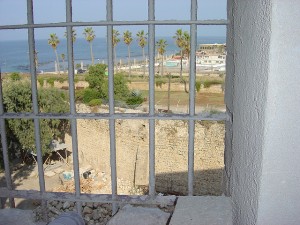When people have their apartments or houses broken into, they tell us that they feel ‘violated.’ They explain that it’s as if someone has stolen something of great value from them. And that is, of course, what has happened. The sanctity of their home has been betrayed by a stranger with utter contempt for that sanctity. No one but you and your family has any business in your home, unless you welcome him in; anyone who cannot conform their behavior to this sacred societal trust is rightly accused, tried, convicted, and punished as a criminal. “A man’s home is his castle,” as one English legal precept has been insisting for 300 years.
But when you’re working for corrections and your internal peace officers come to shake down the libraries, it’s not the same. That’s when you discover that your libraries, your office, your work desk, and the contents of your libraries/ office/work desk have nothing whatever to do with you.
In corrections, you own nothing. That desk you’ve worked at for 20 years? Property of the state. That office? Belongs to the prison. That substantial collection of library material in those shelves/ rooms/cabinets? Taxpayers paid for that. The chair in which you sit? Not yours. Never was. Librarians are even fond of saying “my patrons” or “my clerks” or “my students.” Sorry. They were someone else’s clerks/ patrons/ students before you, and they’ll be someone else’s clerks/ patrons/ students when you’re gone.
Quite naturally, when adult human beings take a vested interest in their work, they become territorial. It’s human nature. But nothing reminds you of just how limited your actual territory is until your libraries are shaken down.
When you sign on with corrections, you must lose the personal concept of ‘mine.’ This is because the only thing you own is something you had before they hired you and something you take home with you each day — your reputation. Everything else you make use of or consume has been bought with state money and is, literally and logically, the property of the state.
The last week of January, our institution conducted a shakedown of the law and lending libraries. The great news is that no drugs or weapons were found. The bad logistical news is that, in every shakedown, the place is left a mess. Not the libraries: the officers were careful to keep the shelves orderly, even though each book had to be searched for contraband. The libraries were fine. But the offices in which work the librarian and inmate library clerks — different story. It will probably take two days before everything is organized and back to normal.
As it should be. When those officers are searching for contraband, that is their main focus and concern – nothing else matters. They come in unannounced, take their time doing what they need to do, and leave unannounced. And by the way: while they’re searching the libraries, you are nowhere near the area. The institution asks you to work temporarily in another office. The librarian is not security staff, and is therefore not a part of this operation. You must allow yourself to be moved out of the way.
After the shakedown, one of my ABLE MINDS assistants heard me mutter something about the contents of an office drawer being in disarray. This was his cue. “They don’t have to do that,” he said.
“I’ll admit I was upset at first. ‘Righteous indignation,’ I think they call it. But let me ask you– who did I choose to work for?”
“The DOC, but–”
“–then I know that occasionally my office will be left a wreck.”
“I can understand them treating us that way. But you’re staff, you’re not doing time!”
“They’re trying to run a prison. Everyone has to be treated the same. They have to shake me down, they cannot assume because I’m an employee that I’m above reproach. Look at the things employees bring into prisons! Everyone is subject to search and no one can be above suspicion.”
“But we’re human beings!”
“Look about you, in this room you and I call the librarian’s office. Nothing in this room is mine. It all belongs to the Governor. Now, if they took my coat or damaged it — something I’ve worked for, something I’ve paid for — that’s a different story.”
“I’ll concede that. But what about your dignity?”
“My office needs straightening, but my dignity’s intact. What do you think?”
“I think you’re taking this a lot easier than I would if I were you.”
“Everyone has their burdens. If you must, be glad you’re not me.”
“Be glad you’re not me,” he said, smiling.
With that he reminded me of something esle that’s mine — my correctional mantra, which is ‘There–but for the grace of God–go I.’
Kinda keeps me humble.
Kinda.

